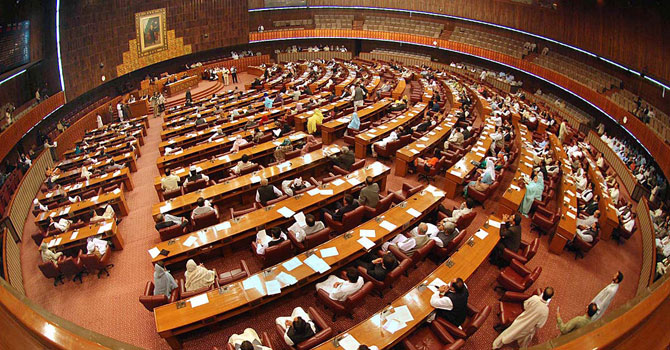
ISLAMABAD, July 3: It was a day of double whammy for the Supreme Court. The Public Accounts Committee (PAC) of the National Assembly released names of retired and serving judges of the apex court who have been allotted more than one residential plots in Islamabad and directed the Auditor General of Pakistan (AGP) to clarify if government funds spent on judges’ salaries and other operations of the Supreme Court could be taken up for scrutiny as is done in the case of other government departments.
The committee met on Tuesday with Nadeem Afzal Gondal in the chair.
Allotment of more than one residential plot to government servants and judges in the capital city was allowed by former prime minister Shaukat Aziz. And PPP government went ahead with the policy of making multiple allotments of residential plots to bureaucrats and judges of the Supreme Court.
Under the policy, a civil servant of the federal government promoted to BS-22, will automatically be given a residential plot of one kanal in Islamabad, even if he already owns one in the city. The same policy was followed for judges of the Supreme Court.
“To me it looks another NRO which the former military man carved out for judges and bureaucrats and successfully implemented to extend his rule,” Mr Gondal said.
He said that on Tuesday the PAC would review the policy under which this favour was extended only to a selected lot.
“It doesn’t make sense why people need more than one residential plot in one city,” questioned the PAC chairman and said the committee’s only concern was to put on record the privileged people and classes in the country. The PAC released names of 15 Supreme Court judges, including three serving judges, who own two plots each in Islamabad.
The list includes names of former chief justice of the Supreme Court Abdul Hameed Dogar and senior judge Mian Shakirullah Jan, who is currently working as the acting Chief Election Commissioner, Justice Tassaduq Hussain Gilani, and Justice Nasirul Mulk, three sitting judges of the SC who own two plots each in sectors D and G of the capital.
Retired Supreme Court judges, Justices Mansoor Ahmad, Mohammad Nawaz Abbasi, Faqir Mohammad Khokhar, Mohammad Javaid Buttar, Syed Saeed Ashhad, Sardar Mohammad Raza Khan, Javed Iqbal, Khalil-ur-Rehman Ramday, Falak Sher, Syed Jamshed Ali and Syed Azhid Hussain also hold ownership rights to two plots in Islamabad.
Former judges Justices Raja Fayyaz Ahmed, Ghulam Rabbani, Chaudhry Ijaz Ahmed, Mohammad Sair Ali and two serving judges Justices Anwar Zaheer Jamali and Khilji Arif Hussain have got one plot each given to them under special scheme meant for BS-22 officers.
The PAC directed the defence secretary to provide a similar list of military generals who got more than one residential plot, along with the policy paper followed in the armed forces to this effect.
The committee released a separate list of 204 BS-22 civil servants of the federal government, both serving and retired, who over the past many years have been allotted one kanal plots for having achieved the highest grade.Over 50 of them already had residential plots allotted to them under the regular federal government housing scheme for public servants.
The PAC asked the auditor-general to clarify, if accounts of the Supreme Court were auditable just like those of other government departments.
The SC in a written response to a PAC query said: “The remuneration payable to the judges of the Supreme Court—Article 81 (a)—and administrative expenses, including the remuneration payable to officers and servants of the court—Article 81 (b)—are amounts which are charged upon the federal consolidated fund and same are not paid out of the public accounts of the federation.”
The SC said the National Assembly had no oversight role on expenditures charged upon the federal consolidated fund, which were duly covered under Article 82 (1) of the Constitution.
Above all, it said, a plain reading of the Constitution would show that the Supreme Court wasn’t part of the government, as explained under the Article 81 of the Constitution.
“The Supreme Court is, in fact, separate from and independent of the government. If, at all, there was any ambiguity on this end, the same is set at rest by Article 90 of the Constitution as now amended.”
In response to the SC letter, the PAC chairman said: “Let’s settle this issue once for all and the AGP should tell the committee in categorical terms, if we have the right to take up SC expenditures.”
The AGPs, both sitting and former, have been arguing during the PAC meetings that the SC expenditures are not only auditable but its registrar, like other principal accounting officers, may be called to the PAC for scrutiny.














































Dear visitor, the comments section is undergoing an overhaul and will return soon.